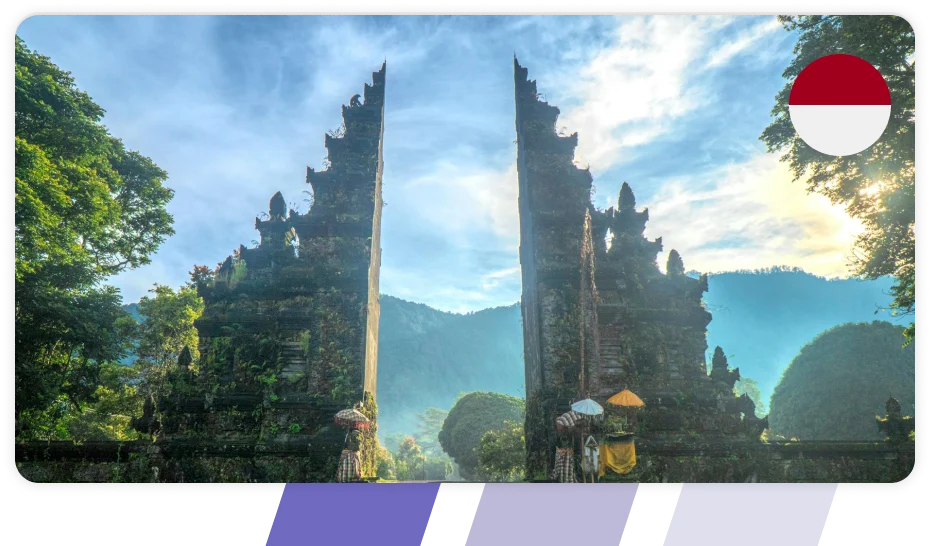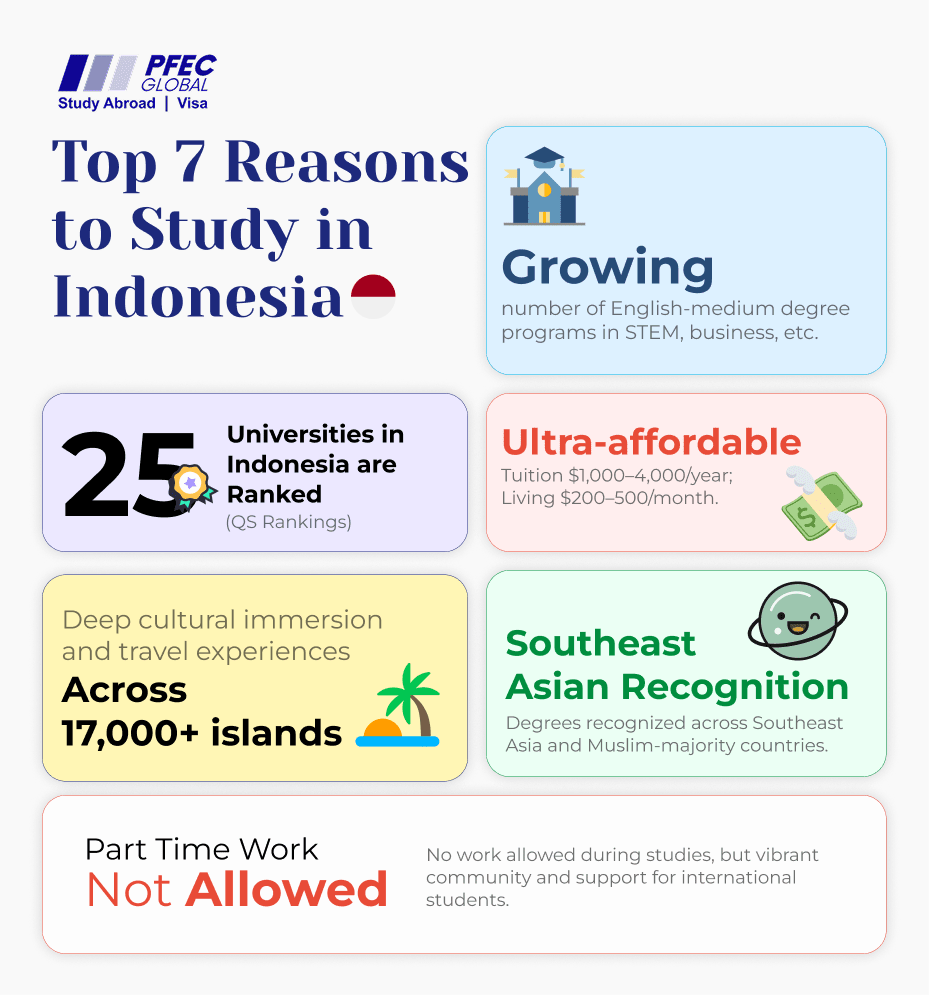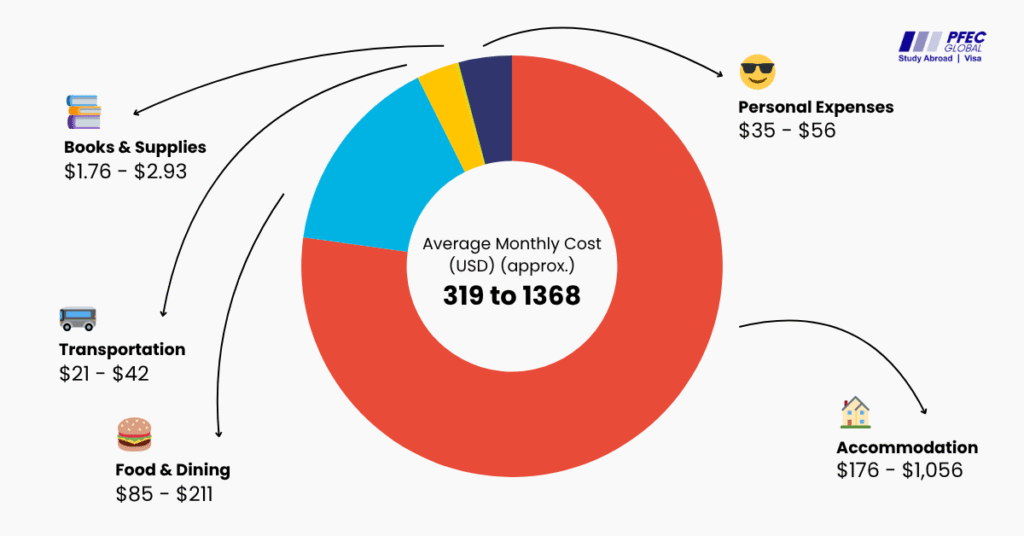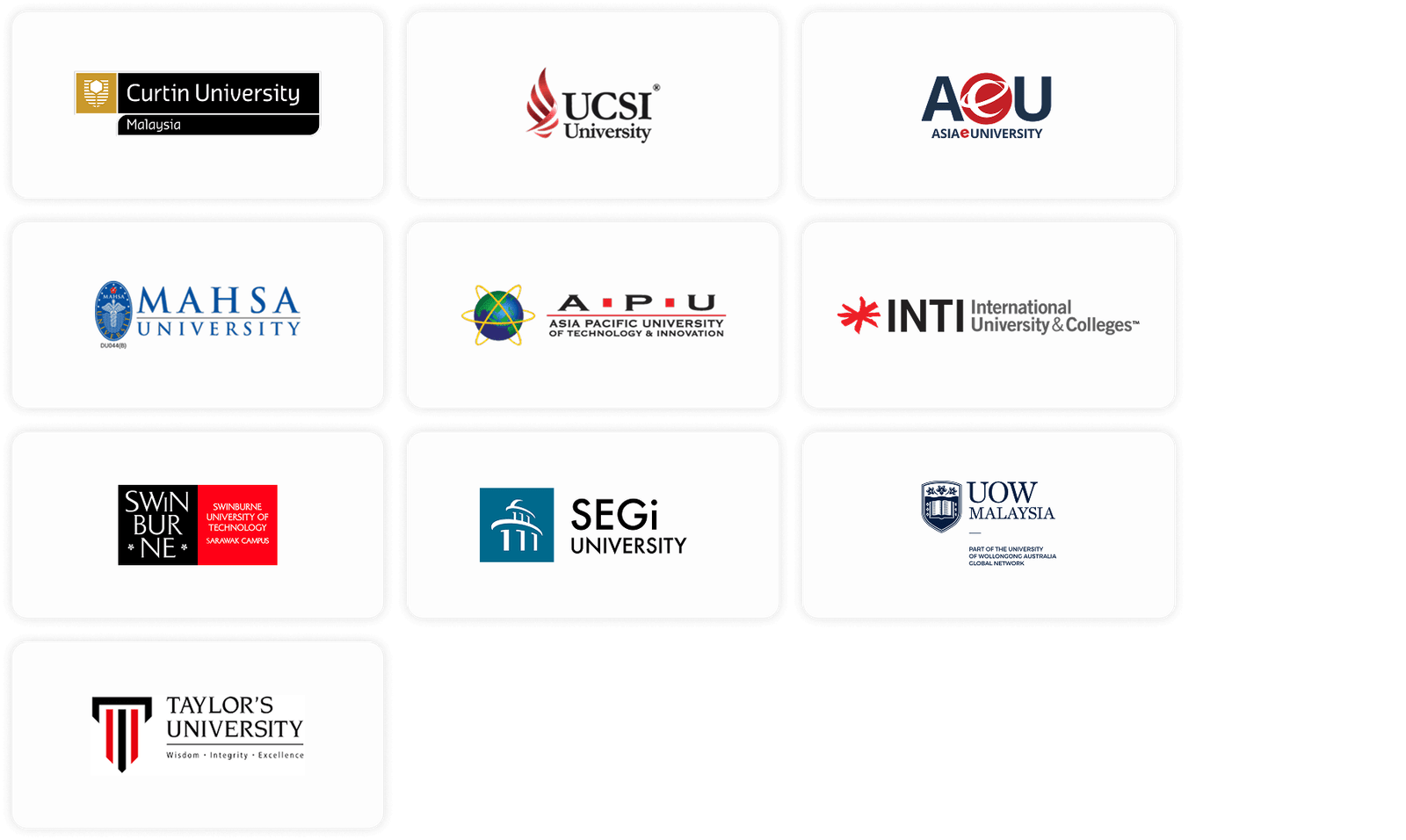Study in Indonesia


Study in Indonesia for Bangladeshi Students
Indonesia, the heart of Southeast Asia’s archipelago, is steadily rising as an appealing destination for Bangladeshi students seeking quality, affordable education in a culturally rich and vibrant environment. With over 960 universities and a strategic vision to expand English-taught programs, Indonesia offers globally recognized degrees, extensive scholarships, and a welcoming multicultural society amid the world’s largest Muslim-majority population.

Why Study in Indonesia?
Affordable, High-Quality Education
Tuition fees typically range from USD 1,000 to USD 4,000 per year for international students—much lower than in the West or other Asian hubs. Top universities like Universitas Indonesia, Gadjah Mada University, and Institut Teknologi Bandung (ITB) rank among the world’s best, excelling in engineering, medicine, environmental studies, and business. English-taught programs are expanding—especially in Jakarta and Bandung—making it easier for international students to pursue their degrees.
Rich Cultural Experience and Global Networking
Students are exposed to more than 17,000 islands and hundreds of ethnic groups, providing an immersive environment in language, art, music, and cuisine. Islam, Hinduism, Christianity, and Buddhism all shape the country’s vibrant social fabric, promoting intercultural understanding and adaptation.
Affordable Living Costs
Monthly living expenses are budget-friendly, with accommodation, transportation, and food costing significantly less than many Asian or Western countries. Students enjoy a quality lifestyle on USD 200–500 per month.
Scholarship Opportunities
The KNB Scholarship and Darmasiswa Scholarship (for non-degree language and cultural studies), as well as various university-based awards, often cover tuition, living allowance, health insurance, and even language courses. Deadlines and eligibility vary: many are open to applicants from Bangladesh and other developing countries.
Biodiversity and Natural Wonders
Students have the opportunity to explore world-renowned sites like Bali, Komodo Island, and Raja Ampat, offering unique extracurricular and research experiences in environmental science, marine biology, and hospitality.
Regional Gateway
As a founding member of ASEAN, Indonesia is ideal for those interested in Southeast Asian economics, politics, and cross-cultural business.
Top Universities in Indonesia (QS World Rankings 2026)
| University | QS 2026 World Rank |
|---|---|
| Universitas Indonesia (UI) | 189 |
| Gadjah Mada University (UGM) | 224 |
| Institut Teknologi Bandung (ITB) | 255 |
| Airlangga University (UNAIR) | 312 |
| IPB University (Bogor) | 426 |
| Institut Teknologi Sepuluh Nopember | 566 |
| Universitas Padjadjaran | 576 |
| Diponegoro University | 721–730 |
| Bina Nusantara University (BINUS) | 851–900 |
| Universitas Sebelas Maret | 1001–1200 |
Popular Programs and Fields of Study
Engineering and Technology:
Civil, Mechanical, Electrical, Computer Science, Data Science, Software Engineering — offered at top universities like ITB, UI, and UGM.
Health and Medical Sciences:
Programs include Medicine (MBBS equivalent), Public Health, Dentistry, Pharmacy, and Nursing — with Universitas Indonesia and Airlangga University as key providers.
Business and Management:
Specializations such as MBA, International Business, Marketing, Finance, and Entrepreneurship are available at UGM, BINUS, and Prasetiya Mulya Business School.
Science and Environment:
Focus areas include Marine Biology, Environmental Science, Forestry, and Climate Change Studies — primarily at IPB, ITB, and UGM.
Islamic Studies:
Academic tracks like Islamic Law (Sharia), Islamic Finance and Banking, and Comparative Religion are available at institutions such as UIN Jakarta and UII Yogyakarta.
Hospitality and Tourism:
Includes Hotel and Resort Management, Tourism Business, and Event Management — with Udayana University and Bali Tourism Institute offering specialized programs.
Creative Industries:
Programs in Animation, Media Design, Fine Arts, and Architecture cater to students interested in the arts and digital creativity.
Admission Requirements
Undergraduate:
Applicants must have completed HSC, A-levels, or equivalent (12 years of schooling). A minimum GPA of 3.0 out of 5.0 (or 60% and above) is generally required. Proof of English proficiency is essential — IELTS (5.5+) or TOEFL (477+) — although many universities offer English-taught programs or accept medium-of-instruction (MOI) certificates. Supporting documents usually include a valid passport, academic transcripts, a statement of purpose, letters of recommendation, and a health clearance.
Master’s/PhD:
Applicants must hold a recognized Bachelor’s or Master’s degree in a related field. English language requirements are slightly higher — IELTS (6.0+) or TOEFL (500+). For PhD programs, a detailed research proposal is typically required.
Visa Requirements:
Students must apply for a VITAS (student visa) using an offer letter from an Indonesian university. Financial proof and health insurance documentation are mandatory. Upon arrival in Indonesia, students must convert their visa into a KITAS (temporary stay permit). Most universities assist international students through the visa and conversion process.
Tuition Fees and Living Costs
| Program Type | Tuition Fees (USD/year) |
|---|---|
| Bachelor’s | 1,000–4,000 |
| Master’s/MS/MBA | 2,500–8,000 (entire program) |
| PhD | 3,500–9,000 (entire program) |

Scholarships for International Students
KNB Scholarship:
Offered by the Indonesian government, this prestigious scholarship is available for Bachelor’s, Master’s, and Doctoral degrees. It provides full tuition coverage, a monthly stipend, settlement and book allowance, health insurance, and Indonesian language training.
Darmasiswa Scholarship:
Designed for international students interested in non-degree studies focused on Indonesian language and culture. It encourages cultural exchange and immersion.
University Scholarships (e.g., UNS Scholarship):
Many Indonesian universities, such as Universitas Sebelas Maret (UNS), offer scholarships that may include full or partial tuition fee waivers, a monthly stipend ranging from IDR 1,500,000 to 2,250,000, free Indonesian language courses, health insurance, and orientation programs.
Post-Study Work Opportunities
No formal post-study work visa:
As of 2025, Indonesia does not offer a dedicated post-study work visa or automatic stay-back policy. International students are expected to return home upon completion of their studies unless they secure a work visa.
Part-time work restrictions:
Student visa holders are not permitted to work part-time in Indonesia. The focus remains primarily on academic achievement during the course of study.
Internships and research:
Select universities may provide research or internship opportunities as part of academic programs, but these are institution-managed and not open-market jobs.
Work after graduation:
Graduates seeking employment must apply for a separate work visa (IMTA), which requires sponsorship from an Indonesian employer. High-skilled professionals—especially in education, tech, engineering, finance, and healthcare—are in demand, particularly in Jakarta.
Work permit process:
Indonesia maintains strict employment rules for foreigners. Job offers from Indonesian employers are mandatory for visa application, and roles typically require advanced qualifications and relevant experience.
Student Life and Culture
Cultural diversity:
Indonesia is home to over 300 languages and hundreds of traditions, offering international students a rich cultural experience. While this diversity can pose adjustment challenges, it also presents rewarding opportunities for deep cultural immersion.
Language skills:
Although many programs are taught in English, learning Bahasa Indonesia can enhance daily life, foster deeper community engagement, and boost career prospects.
Travel and nature:
Students can explore Indonesia’s natural wonders—volcanoes, rainforests, pristine beaches—during semester breaks, making for unforgettable experiences beyond the classroom.
Community support:
Most universities run buddy programs, international student organizations, and orientation sessions. Language courses and social events are also available to help international students adapt and thrive.
Application Timeline and Intakes
Academic year:
Most Indonesian universities follow an academic year that starts in September and ends in June.
Major intakes:
Primary intake occurs in September/October. Some universities also offer a secondary intake during February/March, especially for select programs.
Deadlines:
Application deadlines are typically 4–8 months before the course start date. Students should check specific university websites for exact dates.
Scholarship deadlines:
The KNB Scholarship usually closes in March, while university-based scholarships such as UNS are open from July to November.
Early application is key:
Applying well in advance increases your chances of securing scholarships, obtaining your visa on time, and reserving preferred accommodation options.
Universities

Can I study in Indonesia without IELTS?
Some universities accept alternative proof of English proficiency, such as a medium-of-instruction certificate, although scholarships and leading programs generally require IELTS or TOEFL.
What are the main costs as a Bangladeshi student?
Tuition is USD 1,000–4,000/year; living costs are USD 200–500/month; health insurance, books, and permit fees are extra. Scholarships can substantially reduce these expenses.
Is Bahasa Indonesia required for study?
Many international programs are taught in English, but basic proficiency in Bahasa Indonesia is encouraged for day-to-day life and greater immersion.
Can I work while studying in Indonesia?
No, international students are not permitted to work (part-time or otherwise) on a student visa. After graduation, you must apply for a separate work permit to seek employment in Indonesia.
Are Indonesian degrees recognized internationally?
Yes—degrees from top Indonesian universities are accepted by employers and institutions worldwide, especially in Southeast Asia and Muslim-majority countries.
When should I apply?
Begin the process at least 8 months before intended intake, accounting for scholarship applications, admission processing, and visa arrangements.
What are the main scholarship opportunities for Bangladeshis?
The KNB Scholarship and various university-based awards; check individual deadlines and eligibility.